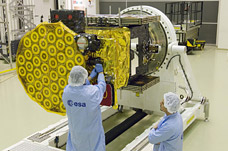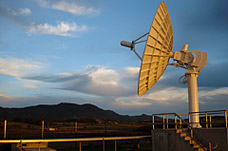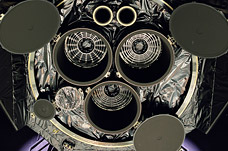European Space Agency
Portugal is a member of the European Space Agency (ESA) since November 14, 2000. The FCT Space Programme supports the activities of the Portuguese Delegation, promoting the participation of Portuguese companies and R&D institutions in ESA space programmes, including those in the framework of the ESA-European Union agreement.
About ESA
The European Space Agency was created in 1975 as a result of the fusion of ESRO (European Space Research Organization) and ELDO (European Launcher Development Organization). With the accession Romania and Poland in the near future, ESA will count 20 member states, Canada being an associated state. Similarly to other large scientific and technological organizations, ESA strives to aggregate the efforts of various European countries in the definition and implementation of Space Programmes which are beyond the reach of any isolated nation, as is the case of the European contribution to the International Space Station (ISS) and Mars exploration missions (Exomars for instance), among many other examples.
For Portugal, ESA represents its main access gate to Space being, for all relevant purposes, our own space agency.
Two of the distinctive aspects of ESA are its industrial policy and its decision making process. ESA's industrial policy is based on the fundamental principle of geographical distribution of industrial return, which represents a strong incentive for the institutional investment of its member states. ESA's decision making process is characterized by a strong involvement from all its member states in the decisions that affect the Agency, irrespective of the size their financial contributions. Although many questions of a programmatic nature are decided by qualified majorities, based on the size of contributions (thus minimizing blockage and delays in the development of some programmes), crucial decisions are always taken unanimously.
As a consequence of the Treaty of Lisbon coming into force in 2010, the European Union, through the European Commission, reinforced its political role in the implementation of Space Programmes together with ESA. Although they are different international organizations (with different member states, though Portugal is a member state of both), this partnership enables Europe to take the challenge of positioning itself side by side with great global space powers. This partnership is also important to further exploit the benefits of space applications and technologies for all European citizens.
Besides Galileo and EGNOS satellite navigation programmes, ESA and the European Union are now starting the initial operations phase of the Earth Observation programme Copernicus.
ESA Programmes subscribed by Portugal



Mandatory subscription programmes include ESA's Science Programme and several technology programmes. Among optional programmes, Portugal subscribes almost all programmatic domains with the exception of those related directly to building and exploiting the International Space Station (ISS).
At the previous ESA Ministerial Council meeting (on December 2016) Portugal reinforced its contribution in several ESA programmes:
- ESA Scientific Programme and mandatory activities
-
- ESA Space Science Programme - mandatory subscription
- PRODEX (ESA's space instrumentation programme)
- Mandatory activities [includes the ESA general budget and the Kourou Space Center]
- Earth Observation and Space Situational Awareness
-
- Earth Observation Envelope Programme (EOEP-5)
- European Earth Watch Programme
- Space Situational Awareness (Period 3)
- Satellite Telecommunications and Integrated Applications
-
- Future preparations
- Core Competitiveness
- SAT-AIS (Satellite Automatic Identification System)
- NEOSAT (Next Generation Platform)
- Satellite Communication for Air Traffic Management (Iris)
- Integrated Applications Promotion
- Partner Govsatcom Percursor
- Satellite Navigation
-
- Navigation innovation and Support Programme (NAVISP)
- Space Exploration
-
- Europeam Exploration Envelope Programme (Exomars e ExPeRT)
- Launchers
-
- Programme for a Reusable In-orbit Demonstrator for Europe (PRIDE)
- Future Launchers Preparatory Programme (FLPP)
- Programme for Ariane and Vega development
- Space Technology
-
- Fundamental technological programmes [TRP and CTP] - mandatory subscription
- General Support Technology Programme (GSTP)
The subscription of new programme and the eventual redefinition of current commitments takes place at Minister level ESA Council meetings. The next ESA Ministerial meeting is scheduled to take place in Italy on November 2012.
How to develop innovative space technology for ESA
ESA employs a very significant part of its budget in contracts with industry and academia, towards space technology research and development activities. ESA makes available all the required information about this procurement process through the web portal Business with ESA, in particular registration as an industrial supplier, the application process, an open calls which are announced through EMITS (Electronic Mailing System for handling Invitations to Tender).
There are several research and technology development programmes to which Portuguese institutions can apply, with complementary application and technological maturity objectives.
Applications, knowledge and technology transfer
Not only space technology development projects are supported through ESA's space programmes. There are also horizontal initiatives which envision promoting a greater involvement of Universities, Laboratories and Innovation Centers, with ESA and the space sector. Some of these initiatives aim at fostering innovation phenomena in companies acting on sectors traditionally far from the space sector.
Ariadna Initiative
The Ariadna initiative has the purpose of connecting European scientific community with ESA, especially in early stages of conceptual studies. This is a flexible and rapid implementation initiative, minimizing the time spent in the application submission process. Promoted within ESA by the Advanced Concepts Team (ACT), the Ariadna initiative targets exclusively research teams of Universities, Laboratories and R&D institutions. Other entities, such as SMEs, may apply by themselves together with academic partners, however, only the latter will be object of funding.
Networking/Partnering Initiative (NPI)
The NPI initiative targets exploring the application in the space domain of advanced technologies developed at Universities, Laboratories and R&D institutions, even in those cases for which the scientific or technological area was not originally related to the space domain.
Innovation Triangle Initiative (ITI)
The ITI initiative aims at supporting the identification, validation and development of innovative space technologies. This initiative singles out technologies developed around ideas and concepts originating from sectors traditionally far from the space domain. ITI's proposal must include three entities with well defined profiles: Customer, Developer and Inventor.
Human Resources Development
ESA Portuguese Trainees
In may 1997 Portugal and ESA have established the first administrative protocol for the development of human resources. This protocol aimed at promoting advanced development of young Portuguese graduates, through a set of specialized traineeships that have been financially supported by FCT. In the context of this administrative protocol, the Agência de Inovação (AdI) was up to the end of 2012 responsible for the implementation of such traineeship programme, including the selection of trainees and the follow-up of their activities.
A new agreement was signed in 2013 between FCT and ESA thus transferring to FCT those competencies and responsibilities that were formerly attributed to AdI.
The traineeships are offered to Portuguese young graduates having a duration ranging from one year up to a maximum of two years. The corresponding technology domains are selected taking into account the specific aspects of the project being undertaken at ESA, its pedagogic context and the prospects of future integration of the trainees in Portuguese innovation-oriented companies.
The announcement of the call for proposals is expected to occur in 2013, subject to publication by FCT.
For more information on the traineeships please follow this link.
ESA Young Graduate Trainees
Besides technological internships in the framework of the Portugal-ESA protocol, ESA regularly opens calls for development of human resources aimed at young graduates of all its member states. For more information please consult ESA's website, Young Graduate Trainees.
